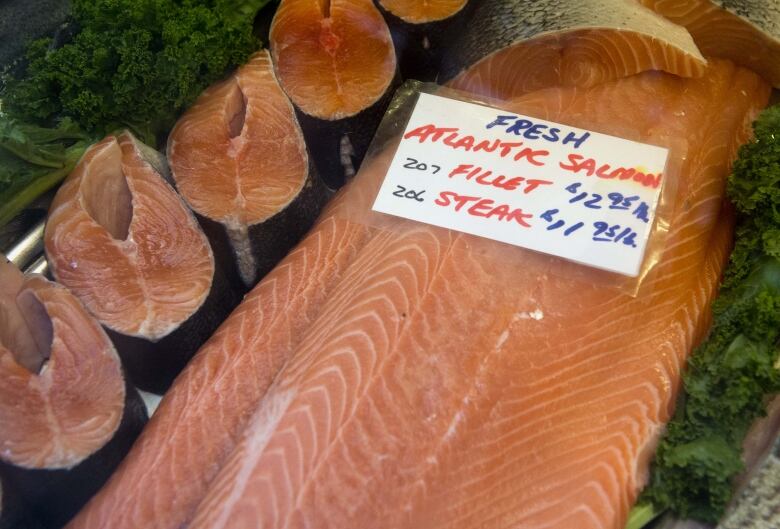Debate continues over $250M aquaculture development for Placentia Bay

Reaction is mixed to news that a Norwegian-based company's $250-million plan to create one of the largest farmed salmon operations in Canada has passed another significant hurdle.
- Major aquaculture project in Placentia Bay released from N.L. environmental assessments
- Province confirms major aquaculture project for Placentia Bay
Late Friday afternoon, the province announced that anaquaculture project proposed by Grieg NL Seafarms Ltd. in Placentia Bay has been released from provincial environmental assessments on several conditions.
"They are still very far away from production," says Mark Lane, executive director of the Newfoundland AquacultureIndustry Association. "This is the very initial first step as an environmental assessment."
"They still have to apply for licences for each of their sites, and there is a very lengthy process that our current companies have gone through to get where they are today."

Speaking on the St.. John's Morning Show Tuesday, Lane said it's so early in the process that Grieg NL is not even eligible for full membership in the aquaculture association because it doesn't currently operate in this province.
Still, he's been watching the moves the company has been making and has closely read the company's environmental assessment documents.
Lane says people watching the process unfold should be cautiously optimistic that Grieg can pull off its ambitious plans for Placentia Bay.
"It's a challenge. It's not something you can do right way and do it perfectly at the moment. You have trials and tribulations and the learning curve. Remember we are an island in the North Atlantic with frigid cold waters. We have sea ice to contend with."
Grieg NL's parent company, Grieg Seafood, employs 700 people in Norway, Shetland Island and British Columbia.

The company's proposal for this province would transform Placentia Bay into one of the largest aquaculture operations in Canada. It includes a $75-million hatchery proposed for Marystown that will stock 11 sea cage sites in Placentia Bay.
Peak employment is estimated at 325 jobs, with as many again expected to be employed in direct spinoffs.
Those job numbers have caught the attention of the provincial government.
Province commits$45M to proposal
Last year, the provincial governmentsigned a memorandum of understanding (MOU) with Grieg NL which will see it put $45 million into the proposal over a number of years in exchange for an ownership stake in the project.
None of the money has yet been paid out.
Provincial Fisheries and Aquaculture Minister Steve Crocker says its far from a done deal.
"There are several more steps that must take place to meet the conditions of the MOU and we will move forward in the coming months to ensure that each and everyone of those steps are given their proper consideration," the minister said.
Crocker told CBC that the announcementthat the project has been released from any further environmental assessments is not the full story on government oversight of the project.

"Now we have to go into the process of the licensing of the cages sites which in itself will bring in another area of consultation with municipalities, the federal government again and the many different departments of the provincial government as well."
Those assurances arenot enough for the Atlantic Salmon Federation, a group dedicated to the protection and restoration of wild Atlantic salmon populations.
Federation calls government decision illegal
In a release distributed Monday, it said it was "alarmed and disappointed" by the province's move to release the project from further environmental assessment.
It said Grieg's plans have the potential to wipe out the remaining wild Atlantic salmon in Placentia Bay through disease, sea lice infestation, and interbreeding.
Groups like the salmon federation and environmental groups have long been suspicious of Grieg's plans for Placentia Bay.

They accuse the province of being too cosy with the proponent and putting too many constraints on public input into the proposal.
The federation believes government's decision to release the project from further assessment is illegal.
"The Government of Newfoundland and Labrador has failed to abide by its own laws in not ordering a full environmental impact statement," said the federation's Steve Sutton in the statement.
"This project sets a precedent by allowing foreign strains of farmed salmon to be raised in sea cages and could have a ripple effect in Canada."
The group alsosays the province is required to conduct a full environmental impact statement if a project poses significant environmental risks, or raises public concern.
"In this case there are both serious risks and huge concern from Newfoundlanders," Sutton said. "Grieg is planning to use Icelandic strains of Atlantic salmon in untested open net pens among a 'threatened' population of wild Atlantic salmon."
He says while Grieginsiststhe farmed salmon will have no impact on indigenous wild salmon populations, the federation believes there's a growing body of international research that "shows marine-based sea cage fish farms have a variety of significant negative effects on the survival of wild Atlantic salmon."
Province says it's trying to strike balance
"The minister is limiting public involvement, scientific knowledge, and opportunities to monitor and mitigate impacts," said Sutton.
The provincial fisheries minister says the province is striving to reach a balance in its role in the development of aquaculture in this province.
"Everything is important in a balance, whether it is the environment versus the economy," said Crocker. "You know, it's not a versus here, I say versus, but its not a versus. There's a balance here and we need to ensure that as we grow our economy (that we) do it in an environmentally sustainable way."
Crocker says overall, aquaculture is among the least environmentally invasive modes of food production, yet its development has the potential to transform economies as it already has along parts the province's south coast.
Meanwhile, the salmon federation says by not ordering a full environmental impact statement on the project, the province is limiting public involvement and scientific knowledge about the potential impacts on Placentia Bay.












_(720p).jpg)


 OFFICIAL HD MUSIC VIDEO.jpg)
.jpg)



























































































